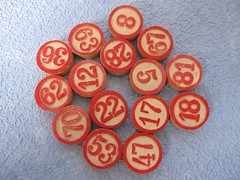Making citizen scientists
 Friday, February 4, 2011 at 4:11PM
Friday, February 4, 2011 at 4:11PM [Cross-posted from Quantified Self]
While talking recently with my QS fellows (thanks Alex, Eri, Seth, and Rajiv) I realized I've been using the term "citizen science" rather loosely. Expanding on my short section in Wandering minds, self-tracking, and citizen science, I'd like to use this post to explore how the expression is used, sketch a little vision of where it could go, and get your thoughts on what it means to you.
Current usage: Citizen-as-helper
 In looking around the net I've found that the general meaning of "citizen science" is that of individuals who help with scientific research by contributing time and resources to projects organized and run by professional scientists. Here's a how it's defined at Citizen scientist: Helping scientists help themselves:
In looking around the net I've found that the general meaning of "citizen science" is that of individuals who help with scientific research by contributing time and resources to projects organized and run by professional scientists. Here's a how it's defined at Citizen scientist: Helping scientists help themselves:
Citizen science is a form of organisation design for collaborative scientific research involving scientists and volunteers, for which internet-based modes of participation enable massive virtual collaboration by thousands of members of the public.
Some cool examples include:
- SETI@home (Search for Extraterrestrial Intelligence - a favorite of mine, as I'm a big Carl Sagan fan, esp. his book The Demon-Haunted World)
- Audubon At Home (generate vital information for the conservation of birds)
- Galaxy Zoo: Hubble (understand how galaxies, and our own, formed)
- Planet Hunters (search for extrasolar planets)
- The Great Sunflower Project (understand how wild bees are doing and what effect that has on pollination of garden plants, crops and wild plants)
- Einstein@Home (search for gravitational waves from spinning neutron stars)
- Folding@home (understand protein folding, misfolding, and related diseases)
This kind of work is groundbreaking (literally) and important for many reasons. The site Science for Citizens (which lists projects you can sign up for) has a fine summary of benefits:
- Enable and encourage people to learn about, participate in, and contribute to science through both informal recreational activities and formal research efforts.
- Inspire greater appreciation and promote a better understanding of science and technology among the general public.
- Create a shared space where scientists can talk with citizens interested in working on or learning about their research projects.
- Satisfy the popular urge to tinker, build, and explore by making it simple and fun for people-singles, parents, grandparents, kids-to jump in and get their hands dirty with science.
With ubiquitous mobile technology, this kind of science is even more empowering. For example, iNaturalist.org is working on an iPhone App. (I love their tagline - "Explore, Learn, Record!")
(An aside: I was pleased to read Analysing data is the future for journalists, says Tim Berners-Lee where he suggests that citizen scientists need to be Personal Citizen Journalists too, which is especially relevant this week given the protests in Egypt and corresponding guerrilla reporting.)
Greater potential: Citizen-as-scientist
As exciting as this movement is (I launched Space Shuttles for NASA, so I'm a fan of big science), I think the expression is misleading and needs to be distinguished from what we do here in the QS community - a different, yet still valid, form of inquiry. The problem is that, as it stands, the current usage pigeonholes the role of individuals in performing science. I found three categories of ways people help: observing (wielding binoculars), labeling (identifying patterns), and computing (contributing CPUs). This puts control squarely under the authority of professional scientists, with citizens as assistants. There are good reasons some projects should work this way, but it ignores the prospect of our taking control of our lives through self-experimentation.
Here's my proposal: Let's hijack the language a bit and frame it to mean "what citizen scientists do," i.e., to move the conversation about our role from helpers to researchers. Maybe a way to look at it is that citizen scientists are people who get genuinely curious about something and decide to test things out for themselves, ideally inviting in like-minded explorers to join and enrich the results. You'll know them when you hear them ask "I wonder why X is happening?", "What if I tried changing Y?", or when someone wonders "Oh really?" when she hears a health claim or recommendation. The recent buttermind experiment is an exciting example (see Seth's analysis here).
Put another way, how about defining it as the intersection of three things:
DIY science + Crowdsourcing + Statistics
Fortunately, I think the timing is right, and momentum is building. Take the upcoming Quantified Self Conference 2011, for example. Or look at how Eri says it at 5 Citizen Science Ideas for 2011 from BioCurious:
- There will be a change in the locus of control- to the individual- when "N," the participants in a health study, goes from n=They to n=Me to n=We.
- When citizen scientists can go from postulating theories to creating studies in which participant created data provides insight into their questions.
In my own Edison project, my hope is that two forthcoming features (group experiments and a quantitative data layer) will provide us self-experimenters with a platform for getting answers to our personal burning questions, and getting ideas, data, support from others along the way.
I'm curious
What do you think?
- What is the role of citizen-as-scientist?
- What kinds of projects should be left to the professionals, and which to the amateur explorer?
- What collaborative self-experiments have you done?
- What ones would you love to see happen and participate in?
- Finally, what tools do you know that support the "DIY science + Crowdsourcing + Statistics" junction?

Reader Comments